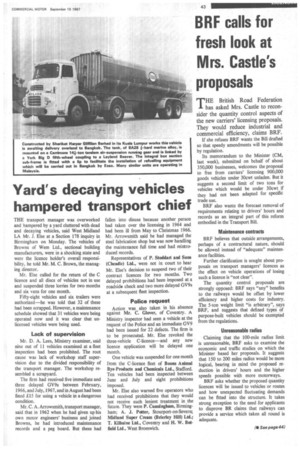Yard's decaying vehicles hampered transport chief
Page 45

If you've noticed an error in this article please click here to report it so we can fix it.
THE transport manager was overworked and hampered by a yard cluttered with dead and decaying vehicles, said West Midland LA Mr. J. Else at a Section 178 inquiry in Birmingham on Monday. The vehicles of Browns of Wem Ltd., sectional building manufacturers, were in a shocking state and were the licence holder's overall responsibility, he told Mr. M. C. Brown, the managing director.
Mr. Else called for the return of the C licence and all discs of vehicles not in use and suspended three lorries for two months and six vans for one month.
Fifty-eight vehicles and six trailers were authorized—he was told that 32 of these had been scrapped. However, a maintenance schedule showed that 31 vehicles were being operated now and it was clear that unlicensed vehicles were being used.
Lack of supervision Mr. D. A. Lees, Ministry examiner, said nine out of 11 vehicles examined at a fleet inspection had been prohibited. The root cause was lack of workshop staff supervision due to the divided responsibility of the transport manager. The workshop resembled a scrapyard.
The firm had received five immediate and three delayed GV9s between February, 1966, and July, 1967, and in August had been fined £15 for using a vehicle in a dangerous condition.
Mr. C. A. Arrowsmith, transport manager, said that in 1962 when he had given up his own motor engineers' business and joined Browns, he had introduced maintenance records and a peg board. But these had fallen into disuse because another person had taken over the licensing in 1964 and had been ill from May to Christmas 1966. Mr. Arrowsmith said he had managed the steel fabrication shop but was now handling the maintenance full time and had reintroduced records.
Representatives of P. Stoddart and Sons (Cheadle) Ltd., were not in court to hear Mr. Else's decision to suspend two of their contract licences for two months. Two delayed prohibitions had been imposed at a roadside check and two more delayed GV9s at a subsequent fleet inspection.
Police request Action was also taken in his absence against Mr. C. Glover, of Coventry. A Ministry inspector had seen a vehicle at the request of the Police and an immediate GV9 had been issued for 22 defects. The firm is to be prosecuted. Mr. Else revoked the three-vehicle C-licence—and any new licence application will be delayed one month.
One vehicle was suspended for one month from the C-licence fleet of Boons Animal Bye-Products and Chemicals Ltd., Stafford. Ten vehicles had been inspected between June and July and eight prohibitions imposed.
Mr. Else also warned five operators who had received prohibitions that they would not receive such lenient treatment in the future. They were P. Cunningham, Birmingham; A. J. Potter, Stourport-on-Severri; Midland Super Cream (Brierley Hill) Ltd.; T. Kilbaine Ltd., Coventry and H. W. Botfield Ltd., West Bromwich.




































































































































